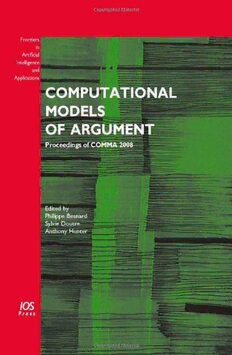Download Computational Models of Argument: Proceedings of COMMA 2008 PDF Free - Full Version
Download Computational Models of Argument: Proceedings of COMMA 2008 by Philippe Besnard, Philippe Besnard, Sylvie Doutre, Anthony Hunter in PDF format completely FREE. No registration required, no payment needed. Get instant access to this valuable resource on PDFdrive.to!
About Computational Models of Argument: Proceedings of COMMA 2008
This volume of Computational Models of Argument focuses on the aim to develop software tools to assist users in constructing and evaluating arguments and counterarguments and/or to develop automated systems for constructing and evaluating arguments and counterarguments. Some articles provide a valuable snapshot of the leading research questions in the area of computational models of argument, others draw on the wealth of research on the philosophical questions surrounding the notions arising in argumentation, or address knowledge representation and reasoning issues emerging from modeling argumentation. They also consider appropriate models of wider rhetorical issues arising in argumentation and propose and evaluate algorithmic solutions associated with generating and judging constellations of arguments. Included are articles proposing standards for exchanging information associated with argumentation so that different systems can work together. In addition, some articles report practical working tools for computational argumentation.IOS Press is an international science, technical and medical publisher of high-quality books for academics, scientists, and professionals in all fields. Some of the areas we publish in: -Biomedicine -Oncology -Artificial intelligence -Databases and information systems -Maritime engineering -Nanotechnology -Geoengineering -All aspects of physics -E-governance -E-commerce -The knowledge economy -Urban studies -Arms control -Understanding and responding to terrorism -Medical informatics -Computer Sciences
Detailed Information
| Author: | Philippe Besnard, Philippe Besnard, Sylvie Doutre, Anthony Hunter |
|---|---|
| Publication Year: | 2008 |
| ISBN: | 9781435678026 |
| Pages: | 441 |
| Language: | English |
| File Size: | 7.224 |
| Format: | |
| Price: | FREE |
Safe & Secure Download - No registration required
Why Choose PDFdrive for Your Free Computational Models of Argument: Proceedings of COMMA 2008 Download?
- 100% Free: No hidden fees or subscriptions required for one book every day.
- No Registration: Immediate access is available without creating accounts for one book every day.
- Safe and Secure: Clean downloads without malware or viruses
- Multiple Formats: PDF, MOBI, Mpub,... optimized for all devices
- Educational Resource: Supporting knowledge sharing and learning
Frequently Asked Questions
Is it really free to download Computational Models of Argument: Proceedings of COMMA 2008 PDF?
Yes, on https://PDFdrive.to you can download Computational Models of Argument: Proceedings of COMMA 2008 by Philippe Besnard, Philippe Besnard, Sylvie Doutre, Anthony Hunter completely free. We don't require any payment, subscription, or registration to access this PDF file. For 3 books every day.
How can I read Computational Models of Argument: Proceedings of COMMA 2008 on my mobile device?
After downloading Computational Models of Argument: Proceedings of COMMA 2008 PDF, you can open it with any PDF reader app on your phone or tablet. We recommend using Adobe Acrobat Reader, Apple Books, or Google Play Books for the best reading experience.
Is this the full version of Computational Models of Argument: Proceedings of COMMA 2008?
Yes, this is the complete PDF version of Computational Models of Argument: Proceedings of COMMA 2008 by Philippe Besnard, Philippe Besnard, Sylvie Doutre, Anthony Hunter. You will be able to read the entire content as in the printed version without missing any pages.
Is it legal to download Computational Models of Argument: Proceedings of COMMA 2008 PDF for free?
https://PDFdrive.to provides links to free educational resources available online. We do not store any files on our servers. Please be aware of copyright laws in your country before downloading.
The materials shared are intended for research, educational, and personal use in accordance with fair use principles.

